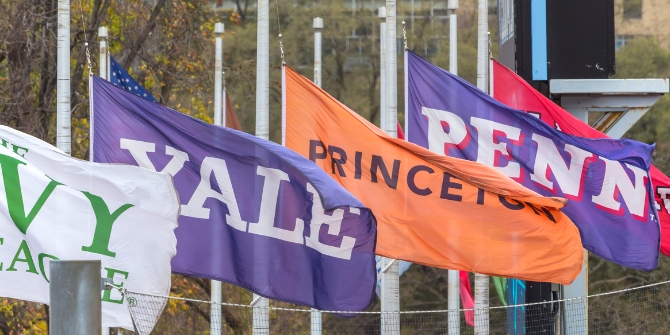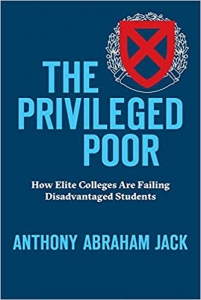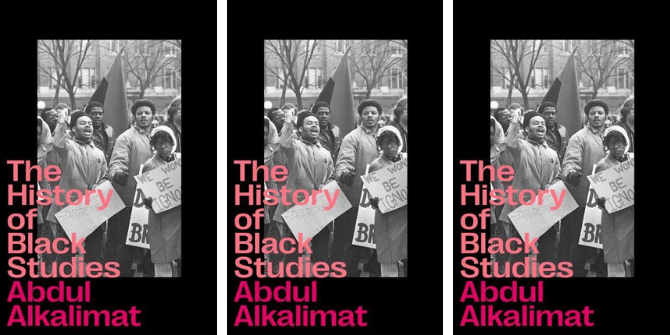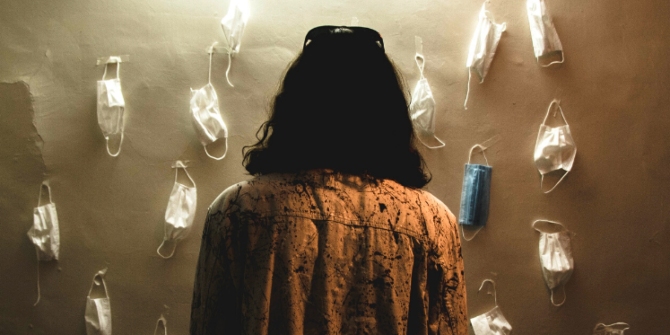In The Privileged Poor: How Elite Colleges Are Failing Disadvantaged Students, Anthony Abraham Jack seeks to better comprehend the unnoticed heterogeneous experiences of first-generation, low-income students navigating campus life at elite universities in the United States. This is a significant contribution to debates on class and mobility, writes Malik Fercovic, that compels us to think carefully about the responsibilities of elite institutions when it comes to inequalities within their student bodies.
The Privileged Poor: How Elite Colleges Are Failing Disadvantaged Students. Anthony Abraham Jack. Harvard University Press. 2019.
The field of social mobility studies lives through vibrant times. Against the backdrop of the dominant Nuffield ‘paradigm’ led by John Goldthorpe and primarily dedicated to measuring intergenerational mobility patterns at the national level, a plethora of recent work has uncovered the diversity of social mobility across class, gender and race, and both between and within national contexts. Though not entirely new, this concern in addressing diversity among the socially mobile appears to have taken on a heightened intensity. A cursory tour of fresh examples of this trend include Paul Pasquali’s Passer les Frontières Sociales, Diane Reay’s Miseducation (2017), Jules Naudet’s Stepping into the Elite and Sam Friedman and Daniel Laurison’s The Class Ceiling. Significantly, the interest in social class and mobility has not been confined to narrow academic circles, but has also reached larger audiences via Didier Eribon’s penetrating 2009 essay Returning to Reims and Édouard Louis’s resounding novels.
Anthony Abraham Jack’s The Privileged Poor: How Elite Colleges Are Failing Disadvantaged Students is part of this growing stream of scholarship and sensibility. Jack’s specific focus is to better comprehend the unnoticed heterogeneous experiences of first-generation, low-income students who have landed through perseverance and good fortune at an elite university in the United States – an institution referred to as ‘Renowned’. Based on extensive qualitative research, this book’s central message is as plain as it is substantial: access is not the same as inclusion. Increasing the number of low-income students in higher education is only the start of a university’s obligations. At least equally relevant is how disadvantaged students integrate themselves once inside elite universities. Attending an elite university for first-generation students is often accompanied by a painful and isolating dislocation between their class of origins and their current location at an Ivy League institution. With clear and vivid prose, Jack uncovers this lingering yet differentiated influence of class in shaping the lives of disadvantaged students in a wider context of escalating inequalities – racial, geographic and residential – in the US.
The Privileged Poor aims to provide a solid answer to the following question: how can students from similarly disadvantaged social backgrounds navigate the same elite university so differently? In order to better understand the lives of low-income students at Renowned, Jack’s main conceptual contribution is to distinguish between the ‘privileged poor’ and the ‘doubly disadvantaged’. The privileged poor refers to poor students educated at preparatory or boarding secondary schools in which they interacted with wealthy peers, immersing themselves earlier in the cultural norms and social rules that dominate privileged environments. The doubly disadvantaged, by contrast, designates those students who enter university from segregated and underfunded state schools, without any significant interactions with well-off students or teachers prior to higher education. In addition to addressing the unobserved diversity within low-income students, this typology brings to the fore the role of secondary schools in moulding the trajectories of disadvantaged student before and during higher education. This conceptual distinction sheds light not only on how but also when social class shapes inequality processes at Renowned.
The Privileged Poor is based on 103 interviews and two years of participant observation at Renowned. As both a first-generation African-American student from an underprivileged background and a researcher working at this prestigious academic institution, Jack is well placed to give a plural voice to the experiences of low-income students at elite universities. Jack’s methods and data-collecting techniques not only registered disadvantaged students’ narratives about their own experiences at university but also observed their daily practices on campus. This allowed him to uncover how disparate pre-university experiences affect the cultural and social resources economically disadvantaged students bring to elite universities, and how they use these resources when navigating campus life. But Jack also offers highly valuable, if initial, reflections on the heavy emotional burden involved in giving a voice to the painful experiences disadvantaged students face at elite universities. Jack’s fieldwork lessons suggest that a thoughtful and skilful researcher needs to know how to deal with this both intellectually and emotionally.
 Image Credit: Flags of the Ivy League fly at Columbia’s Wien Stadium (Kenneth C. Zirkel CC BY SA 4.0)
Image Credit: Flags of the Ivy League fly at Columbia’s Wien Stadium (Kenneth C. Zirkel CC BY SA 4.0)
The Privileged Poor puts forward revealing findings about the different experiences of first-generation students at Renowned. Jack shows that the encounters between disadvantaged students and their privileged peers are powerfully shaped by both a different sense of belonging and displays of wealth saturating university life. But the privileged poor and the doubly disadvantaged face these challenges differently. In the narratives of the privileged poor, there is a clear sense of continuity between secondary school and university in terms of socialising practices and cultural norms. This previous socialisation and early exposure to privilege help them to effectively smooth their transition to campus life. For the doubly disadvantaged, however, their encounters with wealthy peers are experienced as ‘colliding worlds’ or an intense ‘cultural shock’. The everyday exhibitions of wealth among their privileged peers – in the form of expensive clothing or lavish holidays abroad – only serves to remind them that, even though they have managed to gain admission to Renowned, elite universities are not their place.
But the privileged poor and the doubly disadvantaged not only differ in their sense of belonging at Renowned. They also diverge in taking advantage of all the resources available for them at university. Given their familiarity with elite spaces from an earlier age, the privileged poor actively consult their professors to help them when they were struggling in class, and equally devote time to join social clubs and network with people who could be vital connections in the future. The doubly disadvantaged, by contrast, consider these attitudes as ‘sucking up’, as one of the interviewees tellingly puts it. Many of them exclusively focus on studying and obtaining good marks, but are inhibited from attending office hours or reaching out for help when needed. The different support strategies that low-income student undertake, Jack suggests, are not only significant for the transition to university but are also very likely to be consequential in shaping unequal trajectories after university is finished.
And yet, despite all their differences in their adaptation to Renowned, the privileged poor and the doubly disadvantaged also share similar experiences. Here the focus turns to how material hardships prevent both the privileged poor and the doubly disadvantaged from fully integrating to university life, and the role university policies play in exacerbating this. Jack draws our attention to the unintended consequences of policies aggravating the distress or exclusion of disadvantaged students. These policies include a job programme offering poor students to clean their wealthy peers’ bathrooms, an ‘inclusion’ initiative oriented to help poor students afford social events but making them picking up the subsidised tickets in a separate line from well-off students and the closure of dining halls during spring breaks, leaving low-income students hungry. In all three cases, Jack shows, pre-existing structural inequalities are reinforced by reckless policies not only harming disadvantaged students’ sense of dignity, but also effectively increasing their lack of integration at elite universities.
The Privileged Poor thus persuasively shows the complex and multidimensional influence of class inequality at Renowned. Elite universities in the US have increased the diversity of their student body over the past decade. But, as Jack painstakingly reminds us, this is not equivalent to inclusion for many low-income, first-generation students. Unlike the bulk of the existing research insisting on family backgrounds to account for the struggles of low-income students at selective universities, Jack’s distinctive contribution is to signal the role secondary schools play in these processes. As ‘immensely powerful socializing forces’, these institutions differently mould the lives of those poor students who graduated from resource-rich private schools and those from distressed public secondary schools at Renowned. As a skilful interviewer and insightful observer, Jack reveals deep-seated class disparities that manifest themselves not just in the clothes students wear and the holidays they take, but in what they expect of their professors and envisage for themselves while in university and beyond. In so doing, Jack opens up new ground to interrogate the ‘long shadow’ of class inequality throughout the educational system. For all these reasons, this book is a considerable achievement.
Still, notwithstanding its many qualities, The Privileged Poor comes with some limitations. Firstly, Jack’s findings concerning the role of secondary schools need to be considered within the wider sociological literature. As sociologists have long conceptually recognised and empirically documented the significance of socialisation processes outside the family, Jack’s contribution in this respect is somewhat overstated. Here, among other references, Jack could have very well consulted Bernard Lahire’s The Plural Actor – an important book similarly concerned with class and the plurality of socialisation experiences shaping individual lives over their life-course.
Secondly, for all its insistence on class, the book lacks an explicit approach to this key concept. Within sociology there is no consensus on how to define class – the discussion still being highly disputed between the perspectives developed by Erik Olin Wright, Goldthorpe and Pierre Bourdieu. Judging by the literature on which Jack relies, he seems to make his own the Bourdieusian framework – the idea that class is the resulting process of economic, cultural and social resources, allowing some people to accumulate advantages over time relative to others. But why exactly is the Bourdieusian approach the best way to make sense to Jack’s findings? Curiously enough, this mostly remains backstage in the analysis. Although the lack of a formal definition of class does not considerably hinder our understanding of his findings, I believe a clearer conceptual approach on class could have enhanced Jack’s overall argument.
Thirdly, considering the expanding amount of high-quality research on social mobility produced outside the US, Jack’s book is surprisingly unconcerned by it. Indeed, Jack neglects the rich literature cited at the outset of this review, which is directly relevant to the topic at hand and would allow him to place and interrogate his findings within a wider perspective. Why does Jack overlook, like so many sociologists in the US, the work of his non-US-based peers on social class and mobility? Without excusing Jack’s omissions, I think this is related to broader trends concerning the politics of citation and the disparities of academic recognition in the sociological field at the international level, which can limit the advancement of sociology as a whole.
Despite all this, The Privileged Poor remains a significant contribution to the debate on class and mobility as well as a timely provocation to further analysis. As Jack compels us to think carefully both about the campus lives of poor students and the responsibility elite institutions have in this, it is hard to read his book without wondering what LSE is doing to face these challenges. Although previous research has addressed some of the difficulties low-income student face at selective academic institutions in the UK, several points raised by Jack remain underexplored (for example, the role of office hours and employment opportunities, food (in)security for students, undetected stigmatising practices), particularly those related to policies implemented at elite universities. The extent to which universities can effectively contribute to integrate their diverse but highly unequal communities still remains to be seen.
- This review originally appeared at the LSE Review of Books.
Please read our comments policy before commenting.
Note: This article gives the views of the authors, and not the position of USAPP– American Politics and Policy, nor of the London School of Economics.
Shortened URL for this post: http://bit.ly/2w5Gl8p
About the reviewer
Malik Fercovic – LSE Department of Sociology
Malik Fercovic is a MPhil/PhD student in the LSE Department of Sociology. He is also part of the Leverhulme Programme (2016/2017 cohort) at the LSE International Inequalities Institute and the NYLON project. His research investigates the experience of upward social mobility in contemporary Chilean society. Malik holds a MSc in Governance of Risks and Resources from Heidelberg University, and a BA in Sociology from Pontificia Universidad Católica de Chile. Malik’s wider academic interests are in interdisciplinary approaches to social mobility and inequality and cultural sociology.


 Find this book:
Find this book: 



